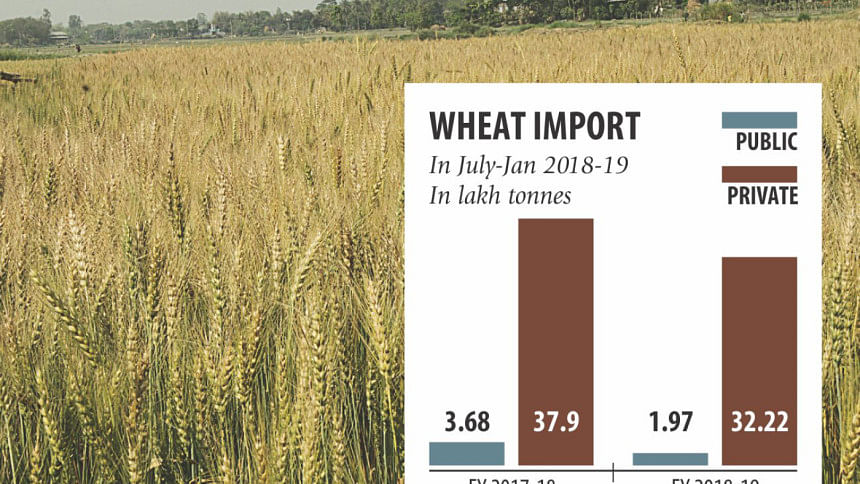Wheat imports drop for higher rice harvests

Wheat imports slumped 17.8 percent year-on-year to 34.20 lakh tonnes in the first seven months of the fiscal year owing to its escalating price in the international market and the relatively lower prices of its substitute rice locally.
The import of the grain soared last fiscal year following losses for recurrent floods, according to two private importers.
Since then farmers have bagged good harvests of rice, reducing the appetite for wheat among a section of consumers.
“Rice prices are competitive this year while the prices of wheat have increased in the international market this year,” said Abul Bashar Chowdhury, chairman of BSM Group, a major commodity importer from Chattogram.
The low-protein wheat's price soared to $240-$270 a tonne in recent months from $190-$230 a year ago, he said.
In addition, higher domestic production of rice has also dampened the prices of the staple in the domestic market.
Retail prices of coarse rice, consumed mostly by the low-income people, fell 10 percent year-on-year to Tk 38-42 a kilogram yesterday in Dhaka city, according to market data by the state-run Trading Corporation of Bangladesh.
Wheat flour prices remained unchanged.
“There is a section of people who switch to wheat if the prices of rice are higher. They return to rice if the prices of the staple remain relatively low,” Chowdhury said.
This is the first time since fiscal 2011-12 that wheat imports dropped. Over the last seven years, spiralling domestic demand trebled wheat import as local production fell short.
Total import by the public and private sector rose to 4.8 percent year-on-year to 58.80 lakh tonnes in fiscal 2017-18, according to food ministry data.
As of January 31, public sector imported 1.97 lakh tonnes and private sector imported 32.22 lakh tonnes, according to Fortnightly Foodgrain Outlook by the food planning and monitoring unit under the food ministry.
“We see a kind of negative growth this time. Total wheat import is likely to fall if the international prices continue to remain up and farmers harvest bumper rice in the next season,” Chowdhury added.
Abdus Shukur, head of supply chain (food and energy) of Bashundhara Group, one of the leading importers and processors of wheat, however, expects wheat imports to not fall come the end of the fiscal year.
“Imports picked up in January,” he said, adding that the total imports this fiscal year would be 60 lakh tonnes.
Domestically, wheat area has contracted further to 3.29 lakh hectares during the current season as many growers have switched to maize and other crops to cash in on higher gains, according to the Department of Agricultural Extension.
Farmers grew the grain on 3.50 lakh hectares and harvested 10.98 lakh tonnes in fiscal 2017-18, according to the Bangladesh Bureau of Statistics.

 For all latest news, follow The Daily Star's Google News channel.
For all latest news, follow The Daily Star's Google News channel. 



Comments